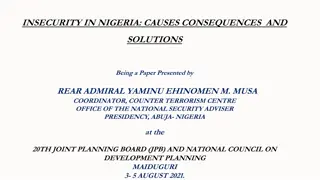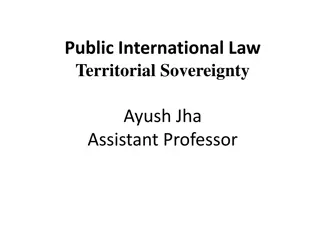Challenged National Sovereignty: Addressing Insecurity in Central America
This research delves into the challenges to national sovereignty, regional coordination, and global influence in Central America, focusing on the issue of insecurity. It explores how security could serve as a foundation for greater regional integration, proposing the Central American Security Strategy (ESCA) to address the complex security environment in the region. The discussion examines the potential role of security in Central American regionalization, highlighting the need for shared sovereignty and effective regional institutions amidst various challenges.
Download Presentation

Please find below an Image/Link to download the presentation.
The content on the website is provided AS IS for your information and personal use only. It may not be sold, licensed, or shared on other websites without obtaining consent from the author. Download presentation by click this link. If you encounter any issues during the download, it is possible that the publisher has removed the file from their server.
E N D
Presentation Transcript
CHALLENGED NATIONAL SOVEREIGNTY, REGIONAL COORDINATION, AND THE REALITY OF GLOBAL INFLUENCE Kari Mariska Pries k.pries.1@research.gla.ac.uk
OUTLINE CHALLENGE TO NATIONAL SOVEREIGNTY: INSECURITY IN THE CENTRAL AMERICAN ISTHMUS The Problem: Insecurity The Question: Can Security Form a Basis for greater Central American Regionalisation*? The Proposal: Central American Security Strategy (ESCA) Challenges in Execution: Macro Challenges in Execution: Micro Regionalism in Security and Competing International Visions: Influences Conclusion * Regionalisation stands in for the Regional Continuum of coordination / collaboration / integration
THE PROBLEM: INSECURITY Unique, Blurred Security Environment Struggling for a decade with situation other violent zones only acknowledging now: Complex Security National / Territorial, Citizen, Individual States failing to address internal and transnational security threats Internationally funded project and programmes challenged by limited effectiveness, duplication of efforts, long-term visioning
THE QUESTION: CAN SECURITY FORM A BASIS FOR CENTRAL AMERICAN REGIONALISATION? Regionalism: Structured Cooperation/Collaboration/Integration (Regionalisation Continuum) in a given geographic area (Central America) requiring supranationalization of authority in a given policy field, which requires some degree of shared sovereignty (Fioramonti 2012, 4) The Role of Crisis in Regionalisation Central America is employing the Regionalisation Continuum in order to address unstable domestic circumstances AND to (re)capture autonomy / increase authority on the international stage Challenges: State-centric nature of Latin America; Political nature of security especially as related to power, governance and elections; General weakness of state institutions leading to weak regional institutions; Usual failure of regional integration efforts
THE PROPOSAL: CENTRAL AMERICA SECURITY STRATEGY (ESCA) Regional Identity and the Central American Integration System (SICA) Pursuit of security through joint efforts of Central American states unique but falls into historical pattern Lack of national successes triggering binary identity : [A] national and regional identity in which the latter is activated once national problems cannot be dealt with domestically [ where] the inability of a country to find solutions to an issue at the national level may trigger the regional identity and thus lead it to search for answers at the bilateral or regional level. (Caballero 2009, 56) With the growing transnational character of organised crime activities in SICA countries and with the rising wave of violence in the region, it was necessary to revise the Strategy adopted in 2007, and this time involving all sectors of society in collaboration with international cooperation, countries and multilateral institutions. (SICA 2011) ESCA adopted in Guatemala City 22 June 2011 To establish the necessary components and activities in Central America to strengthen the security of persons and property which allows our people to achieve human development goals. (SICA 2011)
THE PROPOSAL: CENTRAL AMERICA SECURITY STRATEGY (ESCA) I OWNERSHIP This is our baby, our child. All has been planned by the countries who suffered for this. We identified problems and proposed projects that will aid in the solutions. The process is ours...we contract consultants because we the countries have good experts. [ ] Central America has discovered its incredible expert resources not in theory but in practices (MJSP1, 2012). Initiation Development Means of Achieving Results Agreement on Issues did not Presentation to the International Community
THE PROPOSAL: CENTRAL AMERICA SECURITY STRATEGY (ESCA) II STRUCTURE Traditional Approach ESCA Call for Proposals ($$) Issue: Security Implementing Agency National Security Policies SICA: Defining Priorities Country Needs: Capacity, Funding Specific Project: Independen t Country System Development: Institution Strengthening, Materials etc. IO Specific Project: Independent or Group Specific Project: Group NGO Bank International Community
THE PROPOSAL: CENTRAL AMERICA SECURITY STRATEGY (ESCA) III PILLARS AND RISK AS AGREED AB1: Border Security (Also through SEFRO) AC1: Criminal Investigations AC5: Exchange of Information Technology Platform [BA1: Prevention of Violence Against Women in CA] BB1: Prevention of Youth Violence BE1: Prevention from Local Government Perspective CA1: Modernisation of Penal Systems DB1*: Professionalization and Technologi- fication of Police Forces DB2*: Modernisation of National Security Institutions with a Regional Security Vision ( Mother of the Strategy ) Police, Fiscalia, Justicia *Currently running Combating Crime Prevention Rehabilitation, Reinsertion and Prison Security Institution Strengthening
CHALLENGES IN EXECUTION: MACRO Bilateral Relations between States Reluctance to hand over authority to supranational organisation The International Community, SICA Reliability, SICA Function (diplomatic not implementing body)
CHALLENGES IN EXECUTION: MICRO Structure ( Pillars ) only represent issues which could be agreed upon by Member Countries, not necessarily greatest risks Disagreements of the International Community and SICA over Financing, Monitoring and Evaluation Lack of Regional Vision in Programme Implementation
REGIONALISATION IN SECURITY AND COMPETING STATE VISIONS A: Strategy Splinter B: Operational Integration Components developed through agreement, not negotiation Country-driven process through regional cooperation Local realities breakdown ESCA unity Contemplation of regional realities and experience similarities Lack of buy-in from Police and Military for Regional Partnerships (not consulted) Support of some international partnerships (EU, Spain, Germany) Lack of support from certain international partnerships especially with regards to SICA capacity Potential for project development including concrete indicators 11
REGIONALISM IN SECURITY AND COMPETING INTERNATIONAL VISIONS North America Europe Bi-lateral Integration Sponsorship of Individual Implementing Parties Sponsorship through SICA (Spain located IN the SICA) Enforcement-driven Prevention-driven We will work directly with partner countries, and partner agencies to implement. We are not in the position to provide money directly to SICA. We participate and support the process because we have expertise to give and because we wish to act in solidarity. GERMANY (GiZ): PREVENIR CANADA: ACCBP (crime) / START (victims) EU via SPAIN: SICA
CONCLUSIONS Lack of supranational power delegation does not necessarily compromise regionalisation as Latin American regional projects do not follow theories formulated with respect to the European integration project Central America integrating in order to address domestic and transnational insecurity as well as to re-capture autonomy and/or weight on the international stage Regionalisation in this context also affords greater authority to government officials / executive branch and thus regional efforts (positives) feed back to the domestic level and do not provide significant space for opposition parties or civil society contributions Lack of International By-in to the ESCA continues to significantly hinder the project and compromise the regional character of the strategy























